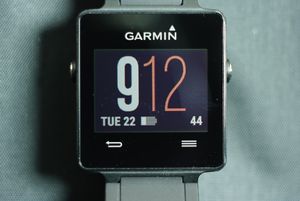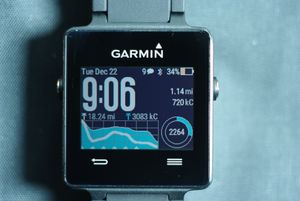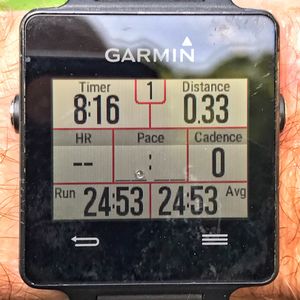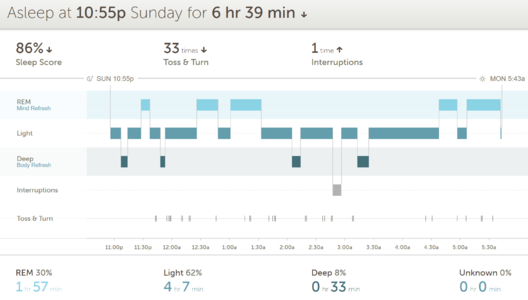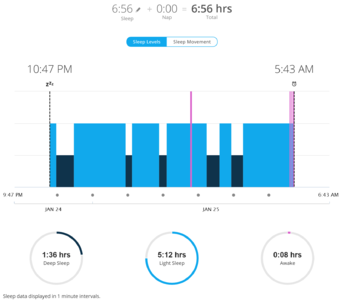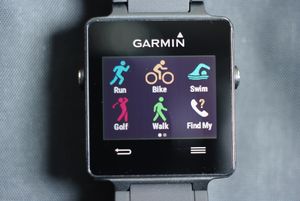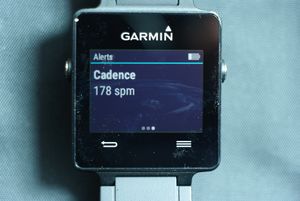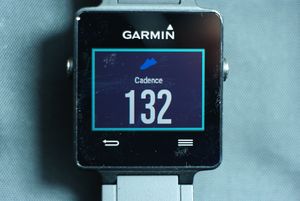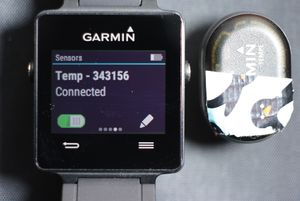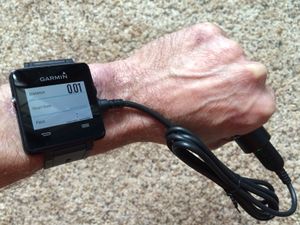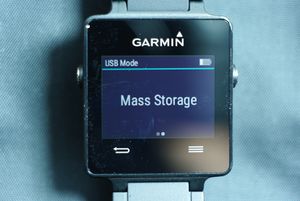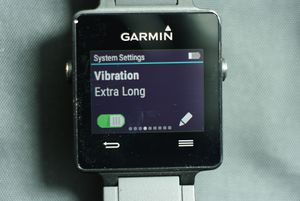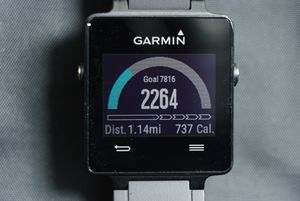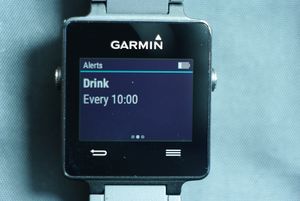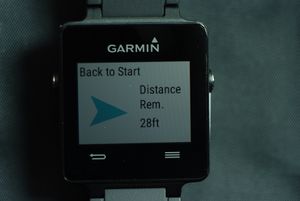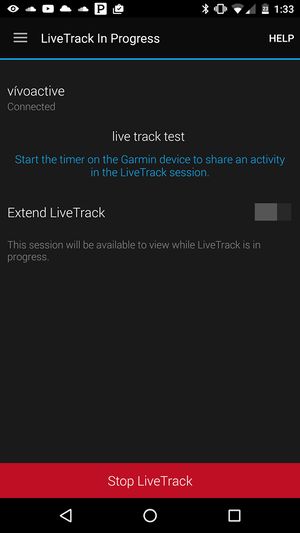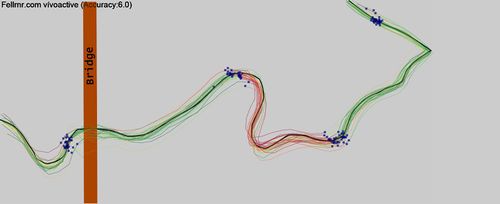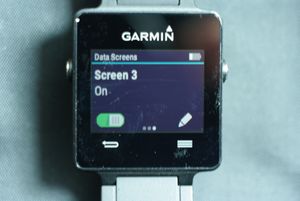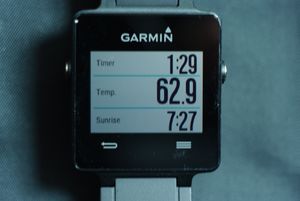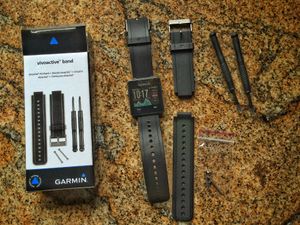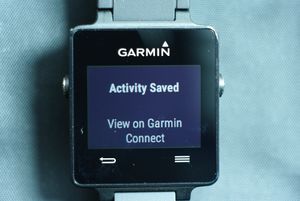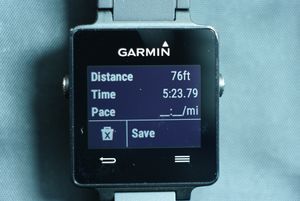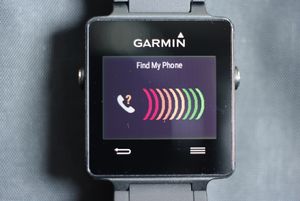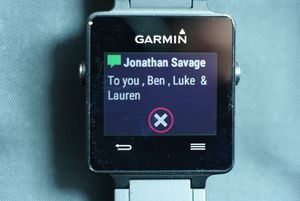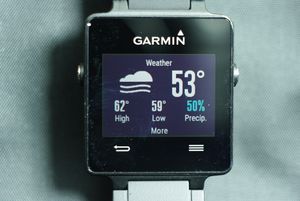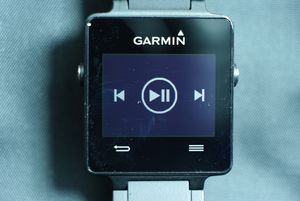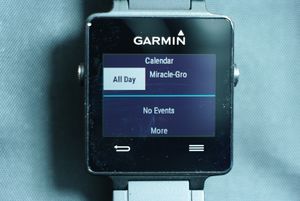Difference between revisions of "Garmin Vivoactive"
User:Fellrnr (User talk:Fellrnr | contribs) m (comment: batch update) |
User:Fellrnr (User talk:Fellrnr | contribs) m (comment: batch update) |
||
| (4 intermediate revisions by the same user not shown) | |||
| Line 1: | Line 1: | ||
{{DISPLAYTITLE:Garmin Vivoactive Review}} | {{DISPLAYTITLE:Garmin Vivoactive Review}} | ||
| − | The {{Garmin Vivoactive}} is the cheapest watch to support Garmin's [[Connect IQ]], and the current pricing puts it into the [[Best Running Watch| budget category of running watches]]. I've got mixed feelings about the Vivoactive; it's a mixture of generally crippled functionality, poor [[GPS Accuracy]], no [[Pace From A Footpod]], but it's small, fairly cheap, has some surprising extra functionality, and it has a nice user interface. It's perhaps best thought of as a good activity monitor that can also act as a running watch. I found myself using it as my standard activity monitor, and using one of my many other watches for recording my runs. The small size and light weight of the Vivoactive make it far less intrusive than larger devices like the [[Garmin Fenix | + | The {{Garmin Vivoactive}} is the cheapest watch to support Garmin's [[Connect IQ]], and the current pricing puts it into the [[Best Running Watch| budget category of running watches]]. I've got mixed feelings about the Vivoactive; it's a mixture of generally crippled functionality, poor [[GPS Accuracy]], no [[Pace From A Footpod]], but it's small, fairly cheap, has some surprising extra functionality, and it has a nice user interface. It's perhaps best thought of as a good activity monitor that can also act as a running watch. I found myself using it as my standard activity monitor, and using one of my many other watches for recording my runs. The small size and light weight of the Vivoactive make it far less intrusive than larger devices like the [[Garmin Fenix 5X]]. Using the Vivoactive just as an activity monitor also helps with battery life, as the GPS chipset drains the battery disproportionately quickly. You can use the Vivoactive with the [[Stryd]] footpod, though you have to run GPS off. Combining the Vivoactive with a [[Stryd]] Footpod seems strange given that Stryd costs twice as much as the watch, but the combination is a small, attractive watch with good functionality and Stryd provides outstanding distance/pace accuracy. There is a version of Vivoactive if that includes [[Optical Heart Rate Monitoring]], the [[Garmin Vivoactive HR]]; I'd generally recommend sticking with this version given the accuracy issues of OHRM. |
| − | * '''How far did I run?''' This is the most basic question, and the Vivoactive is rather grim. | + | <br/> |
| − | * '''How fast am I running?''' Knowing how fast you're running can be a nice to know, or it can be vital for your training or race performance. Because of the nature of GPS, watches that rely on GPS signal alone tend to have serious problems with current pace. | + | For a simple evaluation of a GPS watch, I look at how well it can answer some basic questions: |
| − | * '''Where am I? '''The Vivoactive only as a "back to start" arrow, which is better than nothing, but not great. | + | * '''How far did I run?''' This is the most basic question, and the Vivoactive is rather grim unless you combine it with [[Stryd]]. That means turning off GPS, which may be a problem for some runners that want to know where they've run for their training log. |
| + | * '''How fast am I running?''' Knowing how fast you're running can be a nice to know, or it can be vital for your training or race performance. Because of the nature of GPS, watches that rely on GPS signal alone tend to have serious problems with current pace. Again, this can be solved by combining the Vivoactive with the [[Stryd]] Footpod. | ||
| + | * '''Where am I? '''The Vivoactive only as a "back to start" arrow, which is better than nothing, but not great. If you use [[Stryd]] you'll lose even that as you have to turn off GPS to get the accurate pace/distance that Stryd supports. | ||
* '''What's my cadence? '''[[Cadence]]''' '''is one of the most critical and often overlooked aspects of running. If you get your Cadence right, many other things naturally fall into place. The Vivoactive supports [[Cadence]] via a [[Footpod]] or it can estimate Cadence from its internal accelerometer. It even has alerts for when your Cadence is too low. | * '''What's my cadence? '''[[Cadence]]''' '''is one of the most critical and often overlooked aspects of running. If you get your Cadence right, many other things naturally fall into place. The Vivoactive supports [[Cadence]] via a [[Footpod]] or it can estimate Cadence from its internal accelerometer. It even has alerts for when your Cadence is too low. | ||
| − | For ultramarathon running the Vivoactive doesn't have the battery life. See [[Best Running Watch#Watches for Ultrarunning| Watches for Ultrarunning]] for more details. | + | For ultramarathon running the Vivoactive doesn't have the battery life, but it supports [[Charge On The Run]] surprisingly well. See [[Best Running Watch#Watches for Ultrarunning| Watches for Ultrarunning]] for more details. |
| − | =Pros= | + | {{BuyAmazon|AZID=B00RE1UL52|AZN=Garmin Vivoactive}} |
| + | =Vivoactive Pros= | ||
* The Vivoactive has a reasonable size color display given its small dimensions, though the bezel is larger than you might expect from the latest watches. The resolution of 30K pixels makes it look sharp and clear. The colors are pretty good, and color does make a watch more appealing even if it doesn't add much to the functionality. The standard watch face is quite uninspiring; it makes me think Garmin intentionally set the bar low for developers of custom watch face apps.<br/>[[File:Vivoactive (6).JPG|none|thumb|300px|]] | * The Vivoactive has a reasonable size color display given its small dimensions, though the bezel is larger than you might expect from the latest watches. The resolution of 30K pixels makes it look sharp and clear. The colors are pretty good, and color does make a watch more appealing even if it doesn't add much to the functionality. The standard watch face is quite uninspiring; it makes me think Garmin intentionally set the bar low for developers of custom watch face apps.<br/>[[File:Vivoactive (6).JPG|none|thumb|300px|]] | ||
| − | * The Vivoactive supports Garmin's [[Connect IQ]] that allows for various apps to be installed, including this custom watch face called "Actiface". I love this display, which shows a lot of data in a small space. There is a graph of the last week's steps and calories, a circular progress bar for today's progress towards you step goal, plus some badges for things like hitting your step goal for four days in the last week. The Vivoactive supports Connect IQ for Watch faces, Apps, Widgets, and Data Fields. It includes most device profiles: Heat rate, footpod, temperature, cadence, speed, controls, and power meter. <br/>[[File:Vivoactive (2).JPG|none|thumb|300px|]] | + | * The Vivoactive supports Garmin's [[Connect IQ]] that allows for various apps to be installed, including this custom watch face called "Actiface". I love this display, which shows a lot of data in a small space. There is a graph of the last week's steps and calories, a circular progress bar for today's progress towards you step goal, plus some badges for things like hitting your step goal for four days in the last week. The Vivoactive supports Connect IQ for Watch faces, Apps, Widgets, and Data Fields. It includes most device profiles: Heat rate, footpod, temperature, cadence, speed, controls, and power meter. <br/>[[File:Vivoactive (2).JPG|none|thumb|300px|]]<br/>[[File:Vivoactive CIQ.jpg|none|thumb|300px|]] |
* Sleep tracking with the Vivoactive works reasonably well. You can tell it when you've gone to sleep and woken up, but it does a mostly adequate job of working this out for itself. You don't get any sleep information on the watch itself, which is true of most activity monitors. Instead, you have to go to the mobile app or the website. The Vivoactive consistently indicated I got more sleep than the Basis, including more deep sleep. The Basis is one of the few sleep monitors that will estimate REM sleep. I tend to think the Basis is more accurate, but without a gold standard to compare against, it's hard to draw conclusions.<br/> | * Sleep tracking with the Vivoactive works reasonably well. You can tell it when you've gone to sleep and woken up, but it does a mostly adequate job of working this out for itself. You don't get any sleep information on the watch itself, which is true of most activity monitors. Instead, you have to go to the mobile app or the website. The Vivoactive consistently indicated I got more sleep than the Basis, including more deep sleep. The Basis is one of the few sleep monitors that will estimate REM sleep. I tend to think the Basis is more accurate, but without a gold standard to compare against, it's hard to draw conclusions.<br/> | ||
| − | {| class="wikitable" | + | {| class="wikitable" style="margin-left: auto; margin-right: auto; border: none;" |
|- valign="top" | |- valign="top" | ||
|[[File:Basis Jan24.png|none|thumb|x300px|Sleep monitoring from the Basis]] | |[[File:Basis Jan24.png|none|thumb|x300px|Sleep monitoring from the Basis]] | ||
| Line 18: | Line 21: | ||
* I'm a big fan of having [[Cadence]] alerts, which are easy to set up. I'm pleasantly surprised that this feature is included on a watch that has generally been crippled.<br/>[[File:Vivoactive (20).JPG|none|thumb|300px|]] | * I'm a big fan of having [[Cadence]] alerts, which are easy to set up. I'm pleasantly surprised that this feature is included on a watch that has generally been crippled.<br/>[[File:Vivoactive (20).JPG|none|thumb|300px|]] | ||
* Here's the cadence alert going off, along with a vibration.<br/>[[File:Vivoactive (19).JPG|none|thumb|300px|]] | * Here's the cadence alert going off, along with a vibration.<br/>[[File:Vivoactive (19).JPG|none|thumb|300px|]] | ||
| − | * I was surprised to find the Vivoactive has support for Garmin's temperature sensing pod, the [[ | + | * I was surprised to find the Vivoactive has support for Garmin's temperature sensing pod, the [[Tempe]]. This is something generally only found in their outdoor range. There's no built in thermometer, but I find they don't work well as your wrist is typically at a different temperature to the ambient air.<br/>[[File:Vivoactive (8).JPG|none|thumb|300px|]] |
* The Vivoactive can be charged on the run, which makes is a candidate for ultrarunners. You have to set the Vivoactive (and some other Garmin watches) to "Garmin Mode" for it to work when charging the battery on the run, but once you do it works nicely.<br/>[[File:Vivoactive Charge.jpg|none|thumb|300px|]][[File:Vivoactive (11).JPG|none|thumb|300px|]] | * The Vivoactive can be charged on the run, which makes is a candidate for ultrarunners. You have to set the Vivoactive (and some other Garmin watches) to "Garmin Mode" for it to work when charging the battery on the run, but once you do it works nicely.<br/>[[File:Vivoactive Charge.jpg|none|thumb|300px|]][[File:Vivoactive (11).JPG|none|thumb|300px|]] | ||
* I rather like the ability to configure how long the vibration alerts buzz for. It's a small feature, but nice none the less.<br/>[[File:Vivoactive (10).JPG|none|thumb|300px|]] | * I rather like the ability to configure how long the vibration alerts buzz for. It's a small feature, but nice none the less.<br/>[[File:Vivoactive (10).JPG|none|thumb|300px|]] | ||
| Line 25: | Line 28: | ||
* There is simple "back to start" navigation on the Vivoactive, where it displays a directional arrow and distance to where you started the activity. The arrow is not a compass, so you need to be moving for it to point in the right direction.<br/>[[File:Vivoactive (22).JPG|none|thumb|300px|]] | * There is simple "back to start" navigation on the Vivoactive, where it displays a directional arrow and distance to where you started the activity. The arrow is not a compass, so you need to be moving for it to point in the right direction.<br/>[[File:Vivoactive (22).JPG|none|thumb|300px|]] | ||
* You can connect to Garmin Live Track, which will allow people to see your run as it progresses. This seems to work fine, and the Vivoactive will support Ant+ devices (HRM, etc.) while doing Live Track. I'm not entirely convinced by the usefulness of this; after all if you're carrying your smart phone, you could use that directly.<br/>[[File:livetrack.jpg|none|thumb|300px|]] | * You can connect to Garmin Live Track, which will allow people to see your run as it progresses. This seems to work fine, and the Vivoactive will support Ant+ devices (HRM, etc.) while doing Live Track. I'm not entirely convinced by the usefulness of this; after all if you're carrying your smart phone, you could use that directly.<br/>[[File:livetrack.jpg|none|thumb|300px|]] | ||
| − | =Cons= | + | =Vivoactive Cons= |
| − | * The GPS accuracy of the Vivoactive is rather poor, though it's in line with more expensive watches that Garmin's produced. For some runners this inaccuracy will mean looking elsewhere, but for many others this may be acceptable. If all you're after is a rough estimate of training mileage, then it should be fine. If you're training more seriously, then the errors can mount up and cause knock on problems due to under or overestimating your training load and ability. | + | * The GPS accuracy of the Vivoactive is rather poor, though it's in line with more expensive watches that Garmin's produced. For some runners this inaccuracy will mean looking elsewhere, but for many others this may be acceptable. If all you're after is a rough estimate of training mileage, then it should be fine. If you're training more seriously, then the errors can mount up and cause knock on problems due to under or overestimating your training load and ability. The will support the [[Stryd]] Footpod, though you'll have to turn GPS off to get distance and pace accurately. With the Footpod, you'll get outstanding accuracy, and I recommend this addition to any GPS running watch. <br/>[[File:Bridgevívoactive.jpg|none|thumb|500px|]] |
| − | |||
* One of the more annoying bits of intentional crippling of the Vivoactive is limiting it to just three pages of data. This seems rather gratuitous and irksome; I realize that Garmin want to create differentiation across their model range by using software, but I find this a little egregious.<br/>[[File:Vivoactive (17).JPG|none|thumb|300px|]] | * One of the more annoying bits of intentional crippling of the Vivoactive is limiting it to just three pages of data. This seems rather gratuitous and irksome; I realize that Garmin want to create differentiation across their model range by using software, but I find this a little egregious.<br/>[[File:Vivoactive (17).JPG|none|thumb|300px|]] | ||
| − | * Not only are you limited to three pages of data, each page has exactly three fields. I generally like to have four fields displayed, something the Vivoactive's display would handle easily enough. Occasionally I like to have a single field display so it's easier to read, either in low light conditions or when there's one big of data I need to focus on. This restriction to just three data fields as another bit of crippling.<br/>[[File:Vivoactive (18).JPG|none|thumb|300px|]] | + | * Not only are you limited to three pages of data, each page has exactly three fields. I generally like to have four fields displayed, something the Vivoactive's display would handle easily enough. Occasionally I like to have a single field display so it's easier to read, either in low light conditions or when there's one big of data I need to focus on. This restriction to just three data fields as another bit of crippling, but the support for [[Connect IQ]] offsets this, especially if you use one of the many "single field displays". These data fields take over the entire screen, and provide a wealth of data. For instance, "Flexirunner" will show 8 different fields, which is a lot of data on a small screen, but is still fairly readable.<br/>[[File:Vivoactive (18).JPG|none|thumb|300px|]][[File:Vivoactive CIQ.jpg|none|thumb|300px|]] |
* The strap on the Vivoactive is made of rather cheap, hard plastic. You can buy an upgraded strap, but sadly that's only of marginally better quality. I purchased the upgrade hoping for something more like the Suunto Ambit strap, but I was disappointed.<br/>[[File:Vivoactive Strap.jpg|none|thumb|300px|]] | * The strap on the Vivoactive is made of rather cheap, hard plastic. You can buy an upgraded strap, but sadly that's only of marginally better quality. I purchased the upgrade hoping for something more like the Suunto Ambit strap, but I was disappointed.<br/>[[File:Vivoactive Strap.jpg|none|thumb|300px|]] | ||
* The Vivoactive gives no summary data when you've finished your run, another example of intentional crippling of the watch. A simple indication of time, distance, and pace would seem the least they could do. (You can access the details via the history menu.)<br/>[[File:Vivoactive (1).JPG|none|thumb|300px|]] | * The Vivoactive gives no summary data when you've finished your run, another example of intentional crippling of the watch. A simple indication of time, distance, and pace would seem the least they could do. (You can access the details via the history menu.)<br/>[[File:Vivoactive (1).JPG|none|thumb|300px|]] | ||
* To offset the lack of save summary slightly, the Vivoactive shows time, distance, and pace when paused.<br/>[[File:Vivoactive (23).JPG|none|thumb|300px|]] | * To offset the lack of save summary slightly, the Vivoactive shows time, distance, and pace when paused.<br/>[[File:Vivoactive (23).JPG|none|thumb|300px|]] | ||
* In an unusual bit of crippling, the Vivoactive can set its clock from your connected phone or manually, but not from the GPS signal. <br/>[[File:Vivoactive (9).JPG|none|thumb|300px|]] | * In an unusual bit of crippling, the Vivoactive can set its clock from your connected phone or manually, but not from the GPS signal. <br/>[[File:Vivoactive (9).JPG|none|thumb|300px|]] | ||
| + | =Activity Tracking= | ||
| + | The Vivoactive has a great activity tracking capabilities, especially at this price point. The only thing is it's missing from the | ||
| + | has a similar activity tracking support to most of the rest of the range of recent Garmin watches. Here's a breakdown of the aspects of your daily activity that the 935 will track: | ||
| + | * '''Workouts'''. Obviously, the Garmin 935 will track your runs, and will integrate that information into an overall picture of your daily activity levels. | ||
| + | * '''Steps'''. The step counting in the Garmin 935 is comparable to other devices. When you're walking or running its pretty accurate, but there are other situations where it's a genuinely ambiguous as to whether you are taking steps or not, such as preparing food in the kitchen. I found that the Garmin 935 recorded a very similar number of daily steps as other Garmin devices I wore on the other wrist, which gives me some confidence in their consistency at least. | ||
| + | * '''Floors Climbed'''. The Garmin 935, along with a number of other recent Garmin watches, use the barometric altimeter to determine when you're going up or down steps. This is a rather nice idea, but the accuracy seems to be rather poor. I find the Garmin 935 will report a different number of steps ascended to descended, even though I've never used an elevator on those days. There's also a significant discrepancy between Garmin watches worn concurrently. | ||
| + | * '''Intensity minutes'''. It's not clear how Garmin calculates "intensity minutes", but it seems to use heart rate to determine intensity, with high levels of intensity counting as a multiplier on the actual number of minutes. I've seen some strange discrepancy in intensity minutes when using the optical heart rate monitor, which is not surprising given the accuracy issues. I suspect that changes in the heart rate zone also impact intensity minutes, but the lack of transparency in this calculation makes it hard to evaluate. | ||
| + | * '''Sleep'''. The estimation of sleep can be a little flaky on occasions, but overall it seems to do a reasonable job. It's hard to verify the estimation of sleep, other than checking if the bedtime and rising time seem reasonable. I'm not convinced by the Garmin estimate of how much deep and light sleep you are getting, and I tend to ignore that information as suspect. I have noticed that changing time zone can really mess up the sleep calculation, but hopefully Garmin will resolve this at some point. | ||
| + | * '''Resting Heart Rate'''. It seems that Garmin looks for the lowest heart rate it sees while you're awake, using its sleep detection to ignore heart rate during that time. That closely matches the medical definition of resting heart rate. The value it records seems a little higher than I would expect, and I've seen some discrepancies when I'm wearing the Garmin 935 and the Fenix 5X concurrently. I keep an eye on the reported resting heart rate, as this is a potential red flag for [[Overtraining]] or other health problems, but I'd only be concerned if I see a consistent rise over several days. | ||
| + | * '''Move IQ'''. Garmin will estimate when you're performing an activity even if you've not explicitly recorded it. So, if I walk the dog, which I don't add to my training log, Garmin will automatically detect this as an activity. | ||
| + | * '''Feedback'''. The area where Garmin really shines as an activity tracker is the feedback and inspiration that they provide. The [[Connect IQ]] watch faces can provide an overview of your weekly activity and how today is comparing with other days, which I find is a good way of motivating myself to get moving. Watch faces also provide a progress bar for how close you are to your daily step goal, though I wish that they'd implement some way of seeing your continued progress after you've hit the goal. Some days I can reach several times in my minimum goal, and it would be nice to see this visually. There are also a number of firework displays the watch gives when you hit your goal. These little firework displays could be considered cheesy or annoying, but I found over time that I really appreciate the little bit of positive feedback. You can also get more information on your activity by scrolling through the widgets on the watch, as well as a vast array of information and visualization on both the Garmin Connect smart phone app and their website. | ||
=Smartwatch features= | =Smartwatch features= | ||
These features are quite common on smart watches, allowing you to get some basic information from your Bluetooth attached phone. Remember that these features are only available when your smart phone is in a Bluetooth range. | These features are quite common on smart watches, allowing you to get some basic information from your Bluetooth attached phone. Remember that these features are only available when your smart phone is in a Bluetooth range. | ||
| Line 41: | Line 54: | ||
* You can control you phone's music playback. I prefer a dedicated music player, but I know many runners use their phone. <br/>[[File:Vivoactive (14).JPG|none|thumb|300px|]] | * You can control you phone's music playback. I prefer a dedicated music player, but I know many runners use their phone. <br/>[[File:Vivoactive (14).JPG|none|thumb|300px|]] | ||
* You can access your smartphone's calendar, which some people might find useful. (I don't.)<br/>[[File:Vivoactive (15).JPG|none|thumb|300px|]] | * You can access your smartphone's calendar, which some people might find useful. (I don't.)<br/>[[File:Vivoactive (15).JPG|none|thumb|300px|]] | ||
| − | |||
| − | |||
=Comparison Table= | =Comparison Table= | ||
{{:Best Running Watch-table}} | {{:Best Running Watch-table}} | ||
Latest revision as of 12:41, 18 June 2017
The Garmin Vivoactive is the cheapest watch to support Garmin's Connect IQ, and the current pricing puts it into the budget category of running watches. I've got mixed feelings about the Vivoactive; it's a mixture of generally crippled functionality, poor GPS Accuracy, no Pace From A Footpod, but it's small, fairly cheap, has some surprising extra functionality, and it has a nice user interface. It's perhaps best thought of as a good activity monitor that can also act as a running watch. I found myself using it as my standard activity monitor, and using one of my many other watches for recording my runs. The small size and light weight of the Vivoactive make it far less intrusive than larger devices like the Garmin Fenix 5X. Using the Vivoactive just as an activity monitor also helps with battery life, as the GPS chipset drains the battery disproportionately quickly. You can use the Vivoactive with the Stryd footpod, though you have to run GPS off. Combining the Vivoactive with a Stryd Footpod seems strange given that Stryd costs twice as much as the watch, but the combination is a small, attractive watch with good functionality and Stryd provides outstanding distance/pace accuracy. There is a version of Vivoactive if that includes Optical Heart Rate Monitoring, the Garmin Vivoactive HR; I'd generally recommend sticking with this version given the accuracy issues of OHRM.
For a simple evaluation of a GPS watch, I look at how well it can answer some basic questions:
- How far did I run? This is the most basic question, and the Vivoactive is rather grim unless you combine it with Stryd. That means turning off GPS, which may be a problem for some runners that want to know where they've run for their training log.
- How fast am I running? Knowing how fast you're running can be a nice to know, or it can be vital for your training or race performance. Because of the nature of GPS, watches that rely on GPS signal alone tend to have serious problems with current pace. Again, this can be solved by combining the Vivoactive with the Stryd Footpod.
- Where am I? The Vivoactive only as a "back to start" arrow, which is better than nothing, but not great. If you use Stryd you'll lose even that as you have to turn off GPS to get the accurate pace/distance that Stryd supports.
- What's my cadence? Cadence is one of the most critical and often overlooked aspects of running. If you get your Cadence right, many other things naturally fall into place. The Vivoactive supports Cadence via a Footpod or it can estimate Cadence from its internal accelerometer. It even has alerts for when your Cadence is too low.
For ultramarathon running the Vivoactive doesn't have the battery life, but it supports Charge On The Run surprisingly well. See Watches for Ultrarunning for more details.

| This review was made possible by readers like you buying products via my links. I buy all the products I review through normal retail channels, which allows me to create unbiased reviews free from the influence of reciprocity, or the need to keep vendors happy. It also ensures I don't get "reviewer specials" that are better than the retail versions.
|
Contents
1 Vivoactive Pros
- The Vivoactive has a reasonable size color display given its small dimensions, though the bezel is larger than you might expect from the latest watches. The resolution of 30K pixels makes it look sharp and clear. The colors are pretty good, and color does make a watch more appealing even if it doesn't add much to the functionality. The standard watch face is quite uninspiring; it makes me think Garmin intentionally set the bar low for developers of custom watch face apps.
- The Vivoactive supports Garmin's Connect IQ that allows for various apps to be installed, including this custom watch face called "Actiface". I love this display, which shows a lot of data in a small space. There is a graph of the last week's steps and calories, a circular progress bar for today's progress towards you step goal, plus some badges for things like hitting your step goal for four days in the last week. The Vivoactive supports Connect IQ for Watch faces, Apps, Widgets, and Data Fields. It includes most device profiles: Heat rate, footpod, temperature, cadence, speed, controls, and power meter.
- Sleep tracking with the Vivoactive works reasonably well. You can tell it when you've gone to sleep and woken up, but it does a mostly adequate job of working this out for itself. You don't get any sleep information on the watch itself, which is true of most activity monitors. Instead, you have to go to the mobile app or the website. The Vivoactive consistently indicated I got more sleep than the Basis, including more deep sleep. The Basis is one of the few sleep monitors that will estimate REM sleep. I tend to think the Basis is more accurate, but without a gold standard to compare against, it's hard to draw conclusions.
- The Vivoactive menu is a little different to Garmin's Forerunner or outdoor ranges, but it works reasonably well. It's designed with a touch display in mind, so you can't operate it with just the buttons. This can be an issue when wearing gloves, but I've had no issues using the touch screen in the rain. In addition to the touch screen, there are two hard buttons, one on either side, and two touch buttons just below the screen.
- I'm a big fan of having Cadence alerts, which are easy to set up. I'm pleasantly surprised that this feature is included on a watch that has generally been crippled.
- Here's the cadence alert going off, along with a vibration.
- I was surprised to find the Vivoactive has support for Garmin's temperature sensing pod, the Tempe. This is something generally only found in their outdoor range. There's no built in thermometer, but I find they don't work well as your wrist is typically at a different temperature to the ambient air.
- The Vivoactive can be charged on the run, which makes is a candidate for ultrarunners. You have to set the Vivoactive (and some other Garmin watches) to "Garmin Mode" for it to work when charging the battery on the run, but once you do it works nicely.
- I rather like the ability to configure how long the vibration alerts buzz for. It's a small feature, but nice none the less.
- The Vivoactive has Garmin's standard display of activity tracking. It's rather uninspiring, showing the steps numerically and graphically, along with a guestimate of calories and distance.
- You can set repeating reminders for things like drinking or eating, as well as custom texts.
- There is simple "back to start" navigation on the Vivoactive, where it displays a directional arrow and distance to where you started the activity. The arrow is not a compass, so you need to be moving for it to point in the right direction.
- You can connect to Garmin Live Track, which will allow people to see your run as it progresses. This seems to work fine, and the Vivoactive will support Ant+ devices (HRM, etc.) while doing Live Track. I'm not entirely convinced by the usefulness of this; after all if you're carrying your smart phone, you could use that directly.
2 Vivoactive Cons
- The GPS accuracy of the Vivoactive is rather poor, though it's in line with more expensive watches that Garmin's produced. For some runners this inaccuracy will mean looking elsewhere, but for many others this may be acceptable. If all you're after is a rough estimate of training mileage, then it should be fine. If you're training more seriously, then the errors can mount up and cause knock on problems due to under or overestimating your training load and ability. The will support the Stryd Footpod, though you'll have to turn GPS off to get distance and pace accurately. With the Footpod, you'll get outstanding accuracy, and I recommend this addition to any GPS running watch.
- One of the more annoying bits of intentional crippling of the Vivoactive is limiting it to just three pages of data. This seems rather gratuitous and irksome; I realize that Garmin want to create differentiation across their model range by using software, but I find this a little egregious.
- Not only are you limited to three pages of data, each page has exactly three fields. I generally like to have four fields displayed, something the Vivoactive's display would handle easily enough. Occasionally I like to have a single field display so it's easier to read, either in low light conditions or when there's one big of data I need to focus on. This restriction to just three data fields as another bit of crippling, but the support for Connect IQ offsets this, especially if you use one of the many "single field displays". These data fields take over the entire screen, and provide a wealth of data. For instance, "Flexirunner" will show 8 different fields, which is a lot of data on a small screen, but is still fairly readable.
- The strap on the Vivoactive is made of rather cheap, hard plastic. You can buy an upgraded strap, but sadly that's only of marginally better quality. I purchased the upgrade hoping for something more like the Suunto Ambit strap, but I was disappointed.
- The Vivoactive gives no summary data when you've finished your run, another example of intentional crippling of the watch. A simple indication of time, distance, and pace would seem the least they could do. (You can access the details via the history menu.)
- To offset the lack of save summary slightly, the Vivoactive shows time, distance, and pace when paused.
- In an unusual bit of crippling, the Vivoactive can set its clock from your connected phone or manually, but not from the GPS signal.
3 Activity Tracking
The Vivoactive has a great activity tracking capabilities, especially at this price point. The only thing is it's missing from the has a similar activity tracking support to most of the rest of the range of recent Garmin watches. Here's a breakdown of the aspects of your daily activity that the 935 will track:
- Workouts. Obviously, the Garmin 935 will track your runs, and will integrate that information into an overall picture of your daily activity levels.
- Steps. The step counting in the Garmin 935 is comparable to other devices. When you're walking or running its pretty accurate, but there are other situations where it's a genuinely ambiguous as to whether you are taking steps or not, such as preparing food in the kitchen. I found that the Garmin 935 recorded a very similar number of daily steps as other Garmin devices I wore on the other wrist, which gives me some confidence in their consistency at least.
- Floors Climbed. The Garmin 935, along with a number of other recent Garmin watches, use the barometric altimeter to determine when you're going up or down steps. This is a rather nice idea, but the accuracy seems to be rather poor. I find the Garmin 935 will report a different number of steps ascended to descended, even though I've never used an elevator on those days. There's also a significant discrepancy between Garmin watches worn concurrently.
- Intensity minutes. It's not clear how Garmin calculates "intensity minutes", but it seems to use heart rate to determine intensity, with high levels of intensity counting as a multiplier on the actual number of minutes. I've seen some strange discrepancy in intensity minutes when using the optical heart rate monitor, which is not surprising given the accuracy issues. I suspect that changes in the heart rate zone also impact intensity minutes, but the lack of transparency in this calculation makes it hard to evaluate.
- Sleep. The estimation of sleep can be a little flaky on occasions, but overall it seems to do a reasonable job. It's hard to verify the estimation of sleep, other than checking if the bedtime and rising time seem reasonable. I'm not convinced by the Garmin estimate of how much deep and light sleep you are getting, and I tend to ignore that information as suspect. I have noticed that changing time zone can really mess up the sleep calculation, but hopefully Garmin will resolve this at some point.
- Resting Heart Rate. It seems that Garmin looks for the lowest heart rate it sees while you're awake, using its sleep detection to ignore heart rate during that time. That closely matches the medical definition of resting heart rate. The value it records seems a little higher than I would expect, and I've seen some discrepancies when I'm wearing the Garmin 935 and the Fenix 5X concurrently. I keep an eye on the reported resting heart rate, as this is a potential red flag for Overtraining or other health problems, but I'd only be concerned if I see a consistent rise over several days.
- Move IQ. Garmin will estimate when you're performing an activity even if you've not explicitly recorded it. So, if I walk the dog, which I don't add to my training log, Garmin will automatically detect this as an activity.
- Feedback. The area where Garmin really shines as an activity tracker is the feedback and inspiration that they provide. The Connect IQ watch faces can provide an overview of your weekly activity and how today is comparing with other days, which I find is a good way of motivating myself to get moving. Watch faces also provide a progress bar for how close you are to your daily step goal, though I wish that they'd implement some way of seeing your continued progress after you've hit the goal. Some days I can reach several times in my minimum goal, and it would be nice to see this visually. There are also a number of firework displays the watch gives when you hit your goal. These little firework displays could be considered cheesy or annoying, but I found over time that I really appreciate the little bit of positive feedback. You can also get more information on your activity by scrolling through the widgets on the watch, as well as a vast array of information and visualization on both the Garmin Connect smart phone app and their website.
4 Smartwatch features
These features are quite common on smart watches, allowing you to get some basic information from your Bluetooth attached phone. Remember that these features are only available when your smart phone is in a Bluetooth range.
- The find my phone option is useful to those of us that are absentminded and can never remember where we left it.
- Like other smartwatches, you can get your text messages displayed on the Vivoative when it's connected to your phone via Bluetooth.
- You can get weather details on the Vivoactive, but it needs a Bluetooth connection to the Garmin Connect app to function, so it just saves you the effort of unlocking your phone.
- You can control you phone's music playback. I prefer a dedicated music player, but I know many runners use their phone.
- You can access your smartphone's calendar, which some people might find useful. (I don't.)
5 Comparison Table
I evaluate running watches in three distinct ways. Firstly, you can use a watch on its own, without any kind of Footpod. This is probably the most common way runners use their watch, but you miss out on a lot. The second rating is with a standard Footpod that is available quite cheaply. These Footpod's can be reasonably accurate once the calibrated, but calibration is a little tedious. The final evaluation is with the Stryd Footpod, which is vastly more accurate than any other type of Footpod, or and more accurate than GPS. The table below looks at the score, and the value for money of each watch for each of the three conditions. (I’ve also tested the Apple Watch 3, but I’ve not included it in these tables as it’s not really a running watch.)
| Review | With Stryd Score | With Stryd Value for money | With Footpod Score | With Footpod Value for money | Without Footpod Score | Without Footpod Value for money | Price at Amazon.com |
|---|---|---|---|---|---|---|---|
| Garmin Epix Review | 47 | 4.5 | 31 | 3.9 | 23 | 3.4 | Error: Could not parse data from Amazon! |
| Garmin Fenix 5X Review | 47 | 2.9 | 32 | 2.3 | 24 | 1.9 | Error: Could not parse data from Amazon! |
| Garmin Fenix 3 Review | 45 | 3.8 | 28 | 3.1 | 24 | 3 | Error: Could not parse data from Amazon! |
| Garmin 935 Review | 45 | 3.6 | 30 | 3 | 22 | 2.4 | Error: Could not parse data from Amazon! |
| Garmin Vivoactive HR Review | 40 | 4.9 | 21 | 3.8 | 17 | 3.8 | Error: Could not parse data from Amazon! |
| Garmin 920XT Review | 39 | 4.4 | 30 | 4.7 | 24 | 4.5 | Error: Could not parse data from Amazon! |
| Suunto Spartan Ultra Review | 37 | 2.6 | 27 | 2.3 | 23 | 2.1 | Error: Could not parse data from Amazon! |
| Garmin Vivoactive 3 Review | 36 | 4 | 19 | 2.9 | 15 | 2.8 | Error: Could not parse data from Amazon! |
| Garmin Vivoactive Review | 34 | 5.1 | 14 | 3.4 | 10 | 3.3 | Error: Could not parse data from Amazon! |
| Suunto Spartan Trainer Review | 34 | 3.9 | 23 | 3.7 | 18 | 3.4 | Error: Could not parse data from Amazon! |
| Polar V800 Review | 33 | 2.8 | 26 | 2.8 | 22 | 2.7 | Error: Could not parse data from Amazon! |
| Suunto Ambit2 Review | 32 | 3.9 | 25 | 4.3 | 21 | 4.5 | Error: Could not parse data from Amazon! |
| Suunto Ambit3 Peak Review | 32 | 3.4 | 29 | 4.1 | 25 | 4.2 | Error: Could not parse data from Amazon! |
| Garmin Fenix 2 Review | 31 | 2.9 | 22 | 2.7 | 18 | 2.5 | Error: Could not parse data from Amazon! |
| Suunto Ambit3 Run Review | 30 | 4 | 27 | 5.5 | 23 | 5.9 | Error: Could not parse data from Amazon! |
| Suunto Ambit2 R Review | 30 | 3.5 | 23 | 3.8 | 19 | 3.8 | Error: Could not parse data from Amazon! |
| Garmin 235 Review | 28 | 2.9 | 20 | 2.8 | 12 | 2 | Error: Could not parse data from Amazon! |
| Garmin 620 Review | 27 | 3.8 | 24 | 5.1 | 20 | 5.6 | Error: Could not parse data from Amazon! |
| Garmin 910XT Review | 26 | 3.9 | 26 | 6.1 | 21 | 6.7 | Error: Could not parse data from Amazon! |
| Garmin 310XT Review | 25 | 4.6 | 24 | 8.3 | 18 | 10 | Error: Could not parse data from Amazon! |
| Polar M400 Review | 25 | 4.3 | 15 | 4.5 | 11 | 4.9 | Error: Could not parse data from Amazon! |
| Garmin 225 Review | 25 | 3.8 | 13 | 3.1 | 9 | 2.9 | Error: Could not parse data from Amazon! |
| TomTom Cardio Runner Review | 25 | 3.3 | 10 | 2 | 10 | 2.5 | Error: Could not parse data from Amazon! |
| Polar M430 Review | 25 | 3.2 | 15 | 2.9 | 11 | 2.7 | Error: Could not parse data from Amazon! |
| Garmin 610 Review | 24 | 3.3 | 20 | 4.3 | 14 | 3.9 | Error: Could not parse data from Amazon! |
| Leikr Review | 10 | 1 | 20 | 2.5 | 14 | 2 | Leikr ($380) |
| Epson SF-510 Review | 4 | 0.7 | 6 | 2 | 6 | 3 | Error: Could not parse data from Amazon! |
| Epson SF-810 Review | 4 | 0.6 | 6 | 1.6 | 6 | 2.3 | Error: Could not parse data from Amazon! |
| Garmin 10 Review | 2 | 0.3 | 2 | 0.6 | 2 | 0.9 | Error: Could not parse data from Amazon! |
The score is the sum of how well each watch can answer the four basic questions (how far, how fast, where are you, what's your cadence), plus some bonus points.
- The "How far you've run" will be based on GPS only for "without Footpod" and "with Standard Footpod", but based on Stryd if supported in the "with Stryd Footpod" table..
- How fast you're running assumes you're using a Footpod if it's supported, otherwise the rating is 0-2 based on GPS accuracy.
- The "Where are you?" is based on various navigation features such as back to start, breadcrumbs, and preloaded maps. For some watches, you have to turn GPS off to get the benefit of Stryd, so those watches have worse "where are you scores" with Stryd than without.
- The cadence score uses 1 point for an internal cadence sensor, 2 points for footpod support, 1 point for support from chest strap cadence, and 1 point for cadence alerts.
- I give 1-2 bonus points for application support, 1-2 bonus points for data upload, 1-2 bonus points for Optical Heart Rate Monitoring, and 0-1 bonus points for battery life.
- Value for money is the score divided by the price (at the time I last updated the table.) Your needs may be different, so you might weight the different aspects of the watches differently, or be basing your decision on different criteria totally. Hopefully this table will give you a good starting point for your decision.
5.1 Score Breakdown without a Footpod
| Review | Score | Value for money6 | How far did you run?1 |
How fast are you running?2 |
Where are you?3 |
What's your cadence?4 |
Bonus Points5 | class="unsortable" |
Price at Amazon.com |
|---|---|---|---|---|---|---|---|---|
| Suunto Ambit3 Peak Review | 25 | 4.2 | 8 | 3 | 6 | 2 | 6 | Error: Could not parse data from Amazon! |
| Garmin 920XT Review | 24 | 4.5 | 1 | 2 | 7 | 6 | 8 | Error: Could not parse data from Amazon! |
| Garmin Fenix 3 Review | 24 | 3 | 2 | 1 | 7 | 6 | 8 | Error: Could not parse data from Amazon! |
| Garmin Fenix 5X Review | 24 | 1.9 | 1 | 0 | 9 | 6 | 8 | Error: Could not parse data from Amazon! |
| Suunto Ambit3 Run Review | 23 | 5.9 | 8 | 3 | 5 | 2 | 5 | Error: Could not parse data from Amazon! |
| Garmin Epix Review | 23 | 3.4 | 0 | 0 | 9 | 6 | 8 | Error: Could not parse data from Amazon! |
| Suunto Spartan Ultra Review | 23 | 2.1 | 8 | 2 | 6 | 2 | 5 | Error: Could not parse data from Amazon! |
| Polar V800 Review | 22 | 2.7 | 9 | 4 | 3 | 2 | 4 | Error: Could not parse data from Amazon! |
| Garmin 935 Review | 22 | 2.4 | 1 | 0 | 7 | 6 | 8 | Error: Could not parse data from Amazon! |
| Garmin 910XT Review | 21 | 6.7 | 5 | 3 | 6 | 2 | 5 | Error: Could not parse data from Amazon! |
| Suunto Ambit2 Review | 21 | 4.5 | 4 | 3 | 6 | 2 | 6 | Error: Could not parse data from Amazon! |
| Garmin 620 Review | 20 | 5.6 | 3 | 2 | 2 | 6 | 7 | Error: Could not parse data from Amazon! |
| Suunto Ambit2 R Review | 19 | 3.8 | 4 | 3 | 5 | 2 | 5 | Error: Could not parse data from Amazon! |
| Garmin 310XT Review | 18 | 10 | 7 | 2 | 4 | 0 | 5 | Error: Could not parse data from Amazon! |
| Suunto Spartan Trainer Review | 18 | 3.4 | 5 | 3 | 4 | 2 | 4 | Error: Could not parse data from Amazon! |
| Garmin Fenix 2 Review | 18 | 2.5 | 1 | 0 | 6 | 6 | 5 | Error: Could not parse data from Amazon! |
| Garmin Vivoactive HR Review | 17 | 3.8 | 0 | 0 | 2 | 6 | 9 | Error: Could not parse data from Amazon! |
| Garmin Vivoactive 3 Review | 15 | 2.8 | 0 | 0 | 4 | 4 | 7 | Error: Could not parse data from Amazon! |
| Garmin 610 Review | 14 | 3.9 | 3 | 2 | 3 | 2 | 4 | Error: Could not parse data from Amazon! |
| Leikr Review | 14 | 2 | 5 | 2 | 4 | 0 | 3 | Leikr ($380) |
| Garmin 235 Review | 12 | 2 | 0 | 0 | 2 | 2 | 8 | Error: Could not parse data from Amazon! |
| Polar M400 Review | 11 | 4.9 | 3 | 1 | 1 | 2 | 4 | Error: Could not parse data from Amazon! |
| Polar M430 Review | 11 | 2.7 | 3 | 1 | 1 | 2 | 4 | Error: Could not parse data from Amazon! |
| Garmin Vivoactive Review | 10 | 3.3 | 0 | 0 | 0 | 6 | 4 | Error: Could not parse data from Amazon! |
| TomTom Cardio Runner Review | 10 | 2.5 | 2 | 1 | 0 | 2 | 5 | Error: Could not parse data from Amazon! |
| Garmin 225 Review | 9 | 2.9 | 1 | 1 | 0 | 2 | 5 | Error: Could not parse data from Amazon! |
| Epson SF-510 Review | 6 | 3 | 0 | 0 | 0 | 2 | 4 | Error: Could not parse data from Amazon! |
| Epson SF-810 Review | 6 | 2.3 | 1 | 0 | 0 | 2 | 3 | Error: Could not parse data from Amazon! |
| Garmin 10 Review | 2 | 0.9 | 0 | 0 | 0 | 0 | 2 | Error: Could not parse data from Amazon! |
5.2 Score Breakdown with a Standard Footpod
| Review | Score | Value for money6 | How far did you run?1 |
How fast are you running?2 |
Where are you?3 |
What's your cadence?4 |
Bonus Points5 | class="unsortable" |
Price at Amazon.com |
|---|---|---|---|---|---|---|---|---|
| Garmin Fenix 5X Review | 32 | 2.3 | 1 | 4 | 9 | 10 | 8 | Error: Could not parse data from Amazon! |
| Garmin Epix Review | 31 | 3.9 | 0 | 4 | 9 | 10 | 8 | Error: Could not parse data from Amazon! |
| Garmin 920XT Review | 30 | 4.7 | 1 | 4 | 7 | 10 | 8 | Error: Could not parse data from Amazon! |
| Garmin 935 Review | 30 | 3 | 1 | 4 | 7 | 10 | 8 | Error: Could not parse data from Amazon! |
| Suunto Ambit3 Peak Review | 29 | 4.1 | 8 | 3 | 6 | 6 | 6 | Error: Could not parse data from Amazon! |
| Garmin Fenix 3 Review | 28 | 3.1 | 2 | 1 | 7 | 10 | 8 | Error: Could not parse data from Amazon! |
| Suunto Ambit3 Run Review | 27 | 5.5 | 8 | 3 | 5 | 6 | 5 | Error: Could not parse data from Amazon! |
| Suunto Spartan Ultra Review | 27 | 2.3 | 8 | 2 | 6 | 6 | 5 | Error: Could not parse data from Amazon! |
| Garmin 910XT Review | 26 | 6.1 | 5 | 4 | 6 | 6 | 5 | Error: Could not parse data from Amazon! |
| Polar V800 Review | 26 | 2.8 | 9 | 4 | 3 | 6 | 4 | Error: Could not parse data from Amazon! |
| Suunto Ambit2 Review | 25 | 4.3 | 4 | 3 | 6 | 6 | 6 | Error: Could not parse data from Amazon! |
| Garmin 310XT Review | 24 | 8.3 | 7 | 4 | 4 | 4 | 5 | Error: Could not parse data from Amazon! |
| Garmin 620 Review | 24 | 5.1 | 3 | 2 | 2 | 10 | 7 | Error: Could not parse data from Amazon! |
| Suunto Ambit2 R Review | 23 | 3.8 | 4 | 3 | 5 | 6 | 5 | Error: Could not parse data from Amazon! |
| Suunto Spartan Trainer Review | 23 | 3.7 | 5 | 4 | 4 | 6 | 4 | Error: Could not parse data from Amazon! |
| Garmin Fenix 2 Review | 22 | 2.7 | 1 | 0 | 6 | 10 | 5 | Error: Could not parse data from Amazon! |
| Garmin Vivoactive HR Review | 21 | 3.8 | 0 | 0 | 2 | 10 | 9 | Error: Could not parse data from Amazon! |
| Garmin 610 Review | 20 | 4.3 | 3 | 4 | 3 | 6 | 4 | Error: Could not parse data from Amazon! |
| Garmin 235 Review | 20 | 2.8 | 0 | 4 | 2 | 6 | 8 | Error: Could not parse data from Amazon! |
| Leikr Review | 20 | 2.5 | 5 | 4 | 4 | 4 | 3 | Leikr ($380) |
| Garmin Vivoactive 3 Review | 19 | 2.9 | 0 | 0 | 4 | 8 | 7 | Error: Could not parse data from Amazon! |
| Polar M400 Review | 15 | 4.5 | 3 | 1 | 1 | 6 | 4 | Error: Could not parse data from Amazon! |
| Polar M430 Review | 15 | 2.9 | 3 | 1 | 1 | 6 | 4 | Error: Could not parse data from Amazon! |
| Garmin Vivoactive Review | 14 | 3.4 | 0 | 0 | 0 | 10 | 4 | Error: Could not parse data from Amazon! |
| Garmin 225 Review | 13 | 3.1 | 1 | 1 | 0 | 6 | 5 | Error: Could not parse data from Amazon! |
| TomTom Cardio Runner Review | 10 | 2 | 2 | 1 | 0 | 2 | 5 | Error: Could not parse data from Amazon! |
| Epson SF-510 Review | 6 | 2 | 0 | 0 | 0 | 2 | 4 | Error: Could not parse data from Amazon! |
| Epson SF-810 Review | 6 | 1.6 | 1 | 0 | 0 | 2 | 3 | Error: Could not parse data from Amazon! |
| Garmin 10 Review | 2 | 0.6 | 0 | 0 | 0 | 0 | 2 | Error: Could not parse data from Amazon! |
5.3 Score Breakdown with a Stryd Footpod
| Review | Score | Value for money6 | How far did you run?1 |
How fast are you running?2 |
Where are you?3 |
What's your cadence?4 |
Bonus Points5 | class="unsortable" |
Price at Amazon.com |
|---|---|---|---|---|---|---|---|---|
| Garmin Epix Review | 47 | 4.5 | 10 | 10 | 9 | 10 | 8 | Error: Could not parse data from Amazon! |
| Garmin Fenix 5X Review | 47 | 2.9 | 10 | 10 | 9 | 10 | 8 | Error: Could not parse data from Amazon! |
| Garmin Fenix 3 Review | 45 | 3.8 | 10 | 10 | 7 | 10 | 8 | Error: Could not parse data from Amazon! |
| Garmin 935 Review | 45 | 3.6 | 10 | 10 | 7 | 10 | 8 | Error: Could not parse data from Amazon! |
| Garmin Vivoactive HR Review | 40 | 4.9 | 10 | 10 | 1 | 10 | 9 | Error: Could not parse data from Amazon! |
| Garmin 920XT Review | 39 | 4.4 | 10 | 10 | 1 | 10 | 8 | Error: Could not parse data from Amazon! |
| Suunto Spartan Ultra Review | 37 | 2.6 | 10 | 10 | 6 | 6 | 5 | Error: Could not parse data from Amazon! |
| Garmin Vivoactive 3 Review | 36 | 4 | 10 | 10 | 1 | 8 | 7 | Error: Could not parse data from Amazon! |
| Garmin Vivoactive Review | 34 | 5.1 | 10 | 10 | 0 | 10 | 4 | Error: Could not parse data from Amazon! |
| Suunto Spartan Trainer Review | 34 | 3.9 | 10 | 10 | 4 | 6 | 4 | Error: Could not parse data from Amazon! |
| Polar V800 Review | 33 | 2.8 | 10 | 10 | 3 | 6 | 4 | Error: Could not parse data from Amazon! |
| Suunto Ambit2 Review | 32 | 3.9 | 10 | 10 | 6 | 0 | 6 | Error: Could not parse data from Amazon! |
| Suunto Ambit3 Peak Review | 32 | 3.4 | 10 | 10 | 6 | 0 | 6 | Error: Could not parse data from Amazon! |
| Garmin Fenix 2 Review | 31 | 2.9 | 10 | 10 | 6 | 0 | 5 | Error: Could not parse data from Amazon! |
| Suunto Ambit3 Run Review | 30 | 4 | 10 | 10 | 5 | 0 | 5 | Error: Could not parse data from Amazon! |
| Suunto Ambit2 R Review | 30 | 3.5 | 10 | 10 | 5 | 0 | 5 | Error: Could not parse data from Amazon! |
| Garmin 235 Review | 28 | 2.9 | 10 | 10 | 0 | 0 | 8 | Error: Could not parse data from Amazon! |
| Garmin 620 Review | 27 | 3.8 | 10 | 10 | 0 | 0 | 7 | Error: Could not parse data from Amazon! |
| Garmin 910XT Review | 26 | 3.9 | 10 | 10 | 1 | 0 | 5 | Error: Could not parse data from Amazon! |
| Garmin 310XT Review | 25 | 4.6 | 10 | 10 | 0 | 0 | 5 | Error: Could not parse data from Amazon! |
| Polar M400 Review | 25 | 4.3 | 10 | 10 | 1 | 0 | 4 | Error: Could not parse data from Amazon! |
| Garmin 225 Review | 25 | 3.8 | 10 | 10 | 0 | 0 | 5 | Error: Could not parse data from Amazon! |
| TomTom Cardio Runner Review | 25 | 3.3 | 10 | 10 | 0 | 0 | 5 | Error: Could not parse data from Amazon! |
| Polar M430 Review | 25 | 3.2 | 10 | 10 | 1 | 0 | 4 | Error: Could not parse data from Amazon! |
| Garmin 610 Review | 24 | 3.3 | 10 | 10 | 0 | 0 | 4 | Error: Could not parse data from Amazon! |
| Leikr Review | 10 | 1 | 5 | 2 | 0 | 0 | 3 | Leikr ($380) |
| Epson SF-510 Review | 4 | 0.7 | 0 | 0 | 0 | 0 | 4 | Error: Could not parse data from Amazon! |
| Epson SF-810 Review | 4 | 0.6 | 1 | 0 | 0 | 0 | 3 | Error: Could not parse data from Amazon! |
| Garmin 10 Review | 2 | 0.3 | 0 | 0 | 0 | 0 | 2 | Error: Could not parse data from Amazon! |
5.4 Basic Features
|
Review |
Released | GPS Accuracy |
Weight (oz) | Size (CM3) | Display (mm) | Resolution (Pixels) | Waterproofing | Heart Rate Monitor |
Cadence | Data Upload |
|---|---|---|---|---|---|---|---|---|---|---|
| Garmin Epix Review | 2015 | 6.2 | 3.0 | 48 | 29 x 21 (609mm2) | 205 x 148 (30.3K total) | Good (50m) | Yes | Internal/Footpod/Heart Rate Monitor/Alert | Yes |
| Garmin Fenix 5X Review | 2017 | 5.6 | 3.5 | 36 | 30.5 (round) (731mm2) | 240 diameter (45.2K total) | Good (100m) | Yes | Internal/Footpod/Heart Rate Monitor/Alert | Yes |
| Garmin Fenix 3 Review | 2015 | 6.2 | 2.9 | 33 | 30 (round) (726mm2) | 218 diameter (37.3K total) | Good (100m) | Yes | Internal/Footpod/Heart Rate Monitor/Alert | Yes |
| Garmin 935 Review | 2017 | 5.6 | 1.7 | 24 | 30.5 (round) (731mm2) | 240 diameter (45.2K total) | Good (100m) | Yes | Internal/Footpod/Heart Rate Monitor/Alert | Yes |
| Garmin Vivoactive HR Review | 2016 | 4.9 | 1.7 | 19 | 21 x 29 (609mm2) | 148 x 205 (30.3K total) | Good (50m) | Yes (+OHRM) | Internal/Footpod/Heart Rate Monitor/Alert | Yes |
| Garmin 920XT Review | 2014 | 6.6 | 2.2 | 35 | 29 x 21 (609mm2) | 205 x 148 (30.3K total) | Good (50m) | Yes | Internal/Footpod/Heart Rate Monitor/Alert | Yes |
| Garmin Vivoactive 3 Review | 2017 | 1.5 | 17 | 30.5 (round) (731mm2) | 240 diameter (45.2K total) | Good (50m) | Yes (+OHRM) | Internal/Footpod | Yes | |
| Garmin Vivoactive Review | 2015 | 5.4 | 1.3 | 13 | 29 x 21 (592mm2) | 205 x 148 (30.3K total) | Good (50m) | Yes | Internal/Footpod/Heart Rate Monitor/Alert | Yes |
| Suunto Spartan Trainer Review | 2017 | 7.8 | 2.0 | 25 | 24 x 23 (529mm2) | 128 diameter (12.9K total) | Good (50m) | Yes (+OHRM) | Internal/Footpod | Yes |
| Suunto Ambit2 Review | 2013 | 7.6 | 3.1 | 30 | 29 (round) (661mm2) | 128 diameter (12.9K total) | Good (100m) | Yes | Internal/Footpod | Yes |
| Suunto Ambit3 Peak Review | 2014 | 7.9 | 2.9 | 30 | 29 (round) (661mm2) | 128 diameter (12.9K total) | Good (100m) | Yes | Internal/Footpod | Yes |
| Suunto Spartan Ultra Review | 2016 | 7.1 | 2.7 | 38 | 32 (round) (804mm2) | 320 diameter (80.4K total) | Good (100m) | Yes | Internal (Limited Footpod) | Yes |
| Garmin Fenix 2 Review | 2014 | 5.7 | 3.2 | 32 | 31 (round) (755mm2) | 70 diameter (3.8K total) | Good (50m) | Yes | Internal/Footpod/Heart Rate Monitor/Alert | Yes |
| Suunto Ambit3 Run Review | 2014 | 7.9 | 2.5 | 30 | 29 (round) (661mm2) | 128 x 128 (16.4K total) | Good (50m) | Yes | Internal/Footpod | Yes |
| Suunto Ambit2 R Review | 2013 | 7.6 | 2.5 | 30 | 29 (round) (661mm2) | 128 diameter (12.9K total) | Good (50m) | Yes | Internal/Footpod | Yes |
| Garmin 235 Review | 2015 | 4.9 | 1.5 | 19 | 31 (round) (755mm2) | 215 diameter (36.3K total) | Good (50m) | Yes (+OHRM) | Internal/Footpod | Yes |
| Garmin 620 Review | 2013 | 7.1 | 1.5 | 20 | 25.4 (round) (507mm2) | 180 diameter (25.4K total) | Good (50m) | Yes | Internal/Footpod/Heart Rate Monitor/Alert | Yes |
| Garmin 910XT Review | 2011 | 7.5 | 2.5 | 49 | 33 x 20 (660mm2) | 160 x 100 (16K total) | Good (50m) | Yes | Footpod/Alert | Yes |
| Garmin 310XT Review | 2009 | 7.5 | 2.5 | 63 | 33 x 20 (660mm2) | 160 x 100 (16K total) | Good (50m) | Yes | Footpod | Yes |
| Garmin 225 Review | 2015 | 6.2 | 1.5 | 24 | 25.4 (round) (507mm2) | 180 diameter (25.4K total) | Good (50m) | Yes (+OHRM) | Internal/Footpod | Yes |
| TomTom Cardio Runner Review | 2015 | 6.0 | 2.2 | 30 | 22 x 25 (550mm2) | 144 x 168 (24.2K total) | Good (50m) | Yes (+OHRM) | Internal/Footpod | Yes |
| Polar V800 Review | 2014 | 8.0 | 2.8 | 31 | 23 x 23 (529mm2) | 128 x 128 (16.4K total) | Good (30m) | Yes | Internal/Footpod | Yes |
| Polar M430 Review | 2017 | 7.2 | 2.0 | 24 | 23 x 23 (529mm2) | 128 x 128 (16.4K total) | Good (50m) | Yes (+OHRM) | Internal/Footpod | Yes |
| Polar M400 Review | 2014 | 6.6 | 2.0 | 24 | 23 x 23 (529mm2) | 128 x 128 (16.4K total) | Good (30m) | Yes | Internal/Footpod | Yes |
| Garmin 610 Review | 2011 | 7.3 | 2.5 | 41 | 25.4 (round) (507mm2) | 128 diameter (12.9K total) | Fair (IPX7) | Yes | Footpod/Alert | Yes |
| Leikr Review | 2013 | 7.3 | 2.4 | 25 | 41 x 31 (1271mm2) | 206 x 148 (76.8K total) | Fair (IPX6) | Yes | Footpod | Limited |
| Epson SF-510 Review | 2015 | 4.4 | 1.7 | 24 | 28 x 22 (616mm2) | 128 x 96 (12.3K total) | Good (50m) | Yes | Limited Internal | Limited |
| Epson SF-810 Review | 2015 | 5.5 | 1.8 | 28 | 28 (round) (616mm2) | 128 diameter (12.9K total) | Good (50m) | OHRM Only) | Limited Internal | Limited |
| Garmin 10 Review | 2012 | 3.8 | 1.3 | 33 | 25 x 24 (600mm2) | 55 x 32 (1.8K total) | Good (50m) | No | No | Yes |
|
Review |
Battery Life (hr) |
Tested Battery Life (hr) |
Extended Battery Life (hr) |
Charge On The Run? | Training Effect |
HRV | GPS cache | Sensors |
|---|---|---|---|---|---|---|---|---|
| Garmin Epix Review | 24 | 17.6 | 50 | Yes (with USB=Garmin) | Yes | Record | Yes | Ant+ |
| Garmin Fenix 5X Review | 20 | 23 | 35 | Yes, but can't be worn | Yes | Record | Yes | Bluetooth/Ant+ |
| Garmin Fenix 3 Review | 20 | 22 | 50 | Yes (with USB=Garmin) | Yes | No | Yes | Ant+ |
| Garmin 935 Review | 24 | 24.5 | 60 | Yes, but can't be worn | Yes | Record | Yes | Bluetooth/Ant+ |
| Garmin Vivoactive HR Review | 13 | 13 | Yes (with USB=Garmin) | No | No | Yes | Ant+ | |
| Garmin 920XT Review | 24 | 19 | 40 | No (terminates) | Yes | Record | Yes | Ant+ |
| Garmin Vivoactive 3 Review | 13 | 13 | No | Yes | Bluetooth/Ant+ | |||
| Garmin Vivoactive Review | 10 | 10 | 10 | Yes (with USB=Garmin) | No | No | Yes | Ant+ |
| Suunto Spartan Trainer Review | 10 | 11 | 30 | Yes | Yes | No | Yes | Bluetooth |
| Suunto Ambit2 Review | 15 | 50 | Yes | Yes | Record | Yes | Ant+ | |
| Suunto Ambit3 Peak Review | 20 | 100 | Yes | Yes | Record | Yes | Bluetooth | |
| Suunto Spartan Ultra Review | 18 | 17 | 26 | Yes, but can't be worn | Yes | Record | Yes | Bluetooth |
| Garmin Fenix 2 Review | 15 | 50 | Yes (with USB=Garmin) | Yes | No | Yes | Ant+ | |
| Suunto Ambit3 Run Review | 10 | 10.5 | 100 | Yes | Yes | Record | Yes | Bluetooth |
| Suunto Ambit2 R Review | 8 | 7.3 | 25 | Yes | Yes | Record | Yes | Ant+ |
| Garmin 235 Review | 11 | 11 | Yes, but no optical HR | Yes | No | Yes | Ant+ | |
| Garmin 620 Review | 10 | 10 | No (resets) | Yes | Record | Yes | Ant+ | |
| Garmin 910XT Review | 20 | 20 | Yes, but no display | Yes | Record | No | Ant+ | |
| Garmin 310XT Review | 20 | 20 | Yes, but no display | No | No | No | Ant+ | |
| Garmin 225 Review | 10 | 11 | 10 | No (resets) | No | No | Yes | Ant+ |
| TomTom Cardio Runner Review | 8 | 6.3 | 8 | No (resets) | No | No | Yes | Bluetooth HR |
| Polar V800 Review | 13 | 24 | 50 | No (terminates) | Yes | Display | Predictive | Bluetooth |
| Polar M430 Review | 8 | 8 | 8 | No | No | No | Yes | Bluetooth |
| Polar M400 Review | 8 | 8 | Yes, but can't be worn | No | No | No | Bluetooth | |
| Garmin 610 Review | 8 | 8 | Yes, but no display | Yes | Record | No | Ant+ | |
| Leikr Review | 5 | 6.5 | 5 | Yes, but can't be worn | No | No | Yes (few hours) | Ant+ |
| Epson SF-510 Review | 30 | 30 | 30 | No | No | No | Yes (few hours) | Bluetooth HR |
| Epson SF-810 Review | 20 | 26 | 20 | No | No | No | Yes (few hours) | None |
| Garmin 10 Review | 5 | 5 | No | No | No | No | None |
|
Review |
Color Maps | Breadcrumbs | Courses | To Waypoint | Compass | Reverse course | Beeline to start | Connect IQ | Altimeter |
|---|---|---|---|---|---|---|---|---|---|
| Garmin Epix Review | Yes | Yes | Yes | Yes | Yes | Yes | No | Yes | Yes |
| Garmin Fenix 5X Review | Yes | Yes | Yes | Yes | Yes | Yes | No | No | Yes |
| Garmin Fenix 3 Review | No | Yes | Yes | Yes | Yes | Yes | No | Yes | Yes |
| Garmin 935 Review | No | Yes | Yes | Yes | Yes | Yes | No | No | Yes |
| Garmin Vivoactive HR Review | No | No | No | No | No | No | No | Yes | Yes |
| Garmin 920XT Review | No | Yes | Yes | Yes | Yes | Yes | No | Yes | Yes |
| Garmin Vivoactive 3 Review | No | No | No | No | No | No | No | No | No |
| Garmin Vivoactive Review | No | No | No | No | No | No | Yes | Yes | No |
| Suunto Spartan Trainer Review | No | No | No | No | No | No | Yes | No | No |
| Suunto Ambit2 Review | No | No | Yes | Yes | Yes | Yes | Yes | No | Yes |
| Suunto Ambit3 Peak Review | No | No | Yes | Yes | Yes | Yes | Yes | No | Yes |
| Suunto Spartan Ultra Review | No | Yes | Yes | Yes | Yes | No | Yes | Yes | Yes |
| Garmin Fenix 2 Review | No | Yes | Yes | Yes | Yes | Yes | No | No | Yes |
| Suunto Ambit3 Run Review | No | No | Yes | Yes | Yes | Yes | Yes | No | No |
| Suunto Ambit2 R Review | No | No | Yes | Yes | Yes | Yes | Yes | No | No |
| Garmin 235 Review | No | No | No | No | No | No | Yes | Yes | No |
| Garmin 620 Review | No | No | No | No | No | No | No | No | No |
| Garmin 910XT Review | No | Yes | Yes | Yes | No | Yes | Yes | No | Yes |
| Garmin 310XT Review | No | Yes | Yes | Yes | No | Yes | No | No | No |
| Garmin 225 Review | No | No | No | No | No | No | No | No | No |
| TomTom Cardio Runner Review | No | No | No | No | No | No | No | No | No |
| Polar V800 Review | No | No | Yes | No | No | No | Yes | No | Yes |
| Polar M430 Review | No | No | No | No | No | No | Yes | No | No |
| Polar M400 Review | No | No | No | No | No | No | Yes | No | No |
| Garmin 610 Review | No | No | Yes | Yes | No | No | Yes | No | No |
| Leikr Review | Yes | Yes | Yes | No | No | No | No | No | No |
| Epson SF-510 Review | No | No | No | No | No | No | No | No | No |
| Epson SF-810 Review | No | No | No | No | No | No | No | No | No |
| Garmin 10 Review | No | No | No | No | No | No | No | No | No |
For "navigation":
- Color Maps gives you full color maps, rather like a smart phone, with roads and paths marked out.
- Track Outline is a display of where you've run, rather like a breadcrumb trail. If there are maps, the outline is superimposed otherwise this is just the outline on its own without any context.
- Course Outline is an outline of a route that can be downloaded. I've found this useful during ultras or in unfamiliar cities where I've needed to know where to go.
- Back To Start is a simple arrow point to your starting point, so it won't help you backtrack.
- Back To Waypoint returns you to a previously marked location using a simple arrow to point.
- Compass. A magnetic compass can help you orient yourself or the map. Without a magnetic compass you have to be moving for the GPS to give you a sense of direction.
(Older Reviews: Polar RC3 GPS, Soleus 1.0, Motorola Motoactv.)
